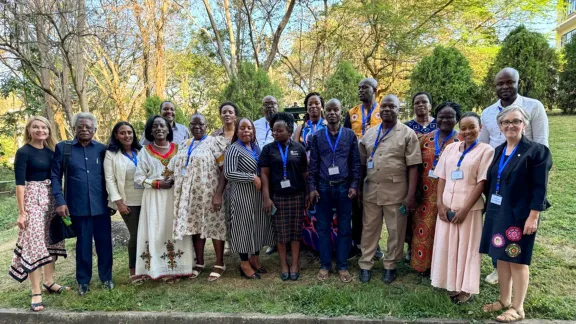
Participants in the third group of the TGLE program at Tumaini University Makumira in Arusha, Tanzania. Photo: LWF/K: Kiilunen
TGLE third cohort participants encouraged to be “a catalyst of change in church and society”
(LWI) – A hands-on-deck experience, is how South African pastor Rev. Thabani Magnificent Duma described his participation in a year-long training on theology, gender justice and leadership education (TGLE), drawing participants from Lutheran churches in Africa.
The experience reshaped his thinking, deepened his passion for justice, and fostered practical skills for advocacy, he said. “So, I will speak of transformation in the: head - thinking and new ideas; heart: passion and love for justice; hand: practical work and hands on the deck,” said Duma, who serves in the Evangelical Lutheran Church in Southern Africa.
He was among 18 participants from 14 LWF member churches who in early November graduated in the TGLE course, offered since 2022 by the LWF in partnership with the Tumaini Makumira University (TUMA) and the Evangelical Lutheran Church in Tanzania (ELCT). The third cohort students comprised ordained, lay, youth, men and women from LWF member churches in the Central African Republic, Ethiopia, Liberia, Madagascar, Malawi, Namibia, Nigeria, South Africa and Zimbabwe.
TUMA Vice-Chancellor Prof. Joseph Parsalaw reminded the graduating class to “make sure” they shared the knowledge they had acquired in order to benefit others. He encouraged them to “put what you have learnt into practice and be a catalyst of change in church and society.”
Demand for transformative learning
Rev. Dr Marcia Blasi, LWF Program Executive for Gender Justice and Women’s Empowerment, described the graduating students as part of a “Reformation movement,” calling on them to be courageous, strong and to promote unity. “We are called to continue to learn, unlearn, learn again and let ourselves be transformed by the love of God and the love for one another,” she said.
We are called to continue learning, unlearn, learn again and let ourselves be transformed by the love of God and the love for one another
Rev. Dr Marcia Blasi, LWF Program Executive for Gender Justice and Women’s Empowerment
Rev. Dr Angela Olotu, Dean of the Faculty of Theology at the ELCT-owned university, said the TGLE program had underscored “the demand for theological education and transformative learning that will produce competent engendered church leaders in Africa” to address the region’s unique contextual and systemic challenges.
Olotu affirmed the increasing number of women actively engaged in various church ministries and the inspiration provided by those in leadership roles. Despite this positive trend, she noted, “more effort is needed to increase their numbers in decision-making boards.” She thanked LWF and its partners for the TGLE program, and expressed her hope that they could establish an institute in Africa that provides theological education, gender justice, and leadership as a specialty for churches in the continent and beyond.
The TGLE third cohort started with a two-week in-person class at TUMA in March, after which students returned to their home countries to continue with research on selected topics. They returned to the campus between October and November to present the research findings, receive the final assessment by the faculty team, and course certificates.
Research findings will be accessible to churches
One of the program’s goals is to make the individual research projects accessible to LWF churches and theological institutions in the region. Some of the students examined how the roles assigned to clergy are influenced by cultural and institutional perceptions of gender equality, when it comes to ordination and other church practices. Others looked at the traditional, social, and economic barriers that discourage women from theological studies, and how the church’s leadership can support women's economic independence.
Several participants assessed the challenges women face in leadership positions and their roles in fostering gender justice and empowerment within church communities.
Others evaluated the LWF Gender Justice Policy and its effectiveness in inspiring similar policies in the churches. Proposals for improvement included the creation of independent women’s departments within churches to support gender justice initiatives more effectively.
The TGLE program is funded through the Hélène Ralivao Fund (HRF), which the LWF established in 2021 to honor the legacy of Malagasy Lutheran Church theologian and women’s rights advocate. The three cohorts that have successfully completed the training bring the total number of graduates to 59, representing 15 LWF member churches. HRF is fostering systemic change that aligns with Hélène Ralivao’s aspirations.
The TGLE program is funded through the Hélène Ralivao Fund. LWF established the fund in June 2021 as a legacy to the Malagasy Lutheran Church theologian after whom it is named, for her dedicated service to the church and to women’s theological education and leadership in her home country Madagascar and beyond.
The TGLE program incorporates a two-week intensive seminar of collaborative and inclusive learning at Tumaini University Makumira. After the seminar, participants conduct action-oriented research in their home contexts and return to Makumira to share their findings during a one-week seminar. So far, the 59 participants who have successfully completed the program, work in various church ministries.


